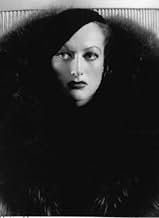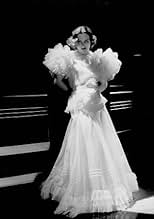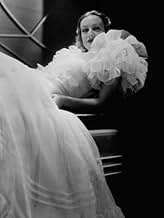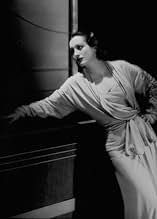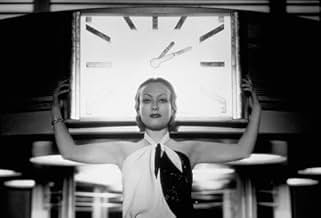A socialite begins a shipboard romance with a wealthy man, but is blackmailed by a former lover.A socialite begins a shipboard romance with a wealthy man, but is blackmailed by a former lover.A socialite begins a shipboard romance with a wealthy man, but is blackmailed by a former lover.
- Director
- Writers
- Stars
- Awards
- 4 wins total
Sidney Bracey
- Waiter
- (uncredited)
Edward LeSaint
- Dr. Sanders
- (uncredited)
Edgar Norton
- Darrow's Butler
- (uncredited)
Lee Phelps
- Dennis, Darrow's Chauffeur
- (uncredited)
Harry Stubbs
- Ship's Steward
- (uncredited)
Charles Williams
- Reporter
- (uncredited)
- Director
- Writers
- All cast & crew
- Production, box office & more at IMDbPro
Featured reviews
... unlike so many lost or unavailable films. The plot initially seems not so unusual, especially for a Joan Crawford MGM vehicle of the 1930's. Joan plays a fabulously wealthy playgirl living in South America who decides to return home for a multitude of reasons - she wants to turn over a new leaf, she wants to make up with the mother (May Robson) who has been pushing her away all her life, but most of all she wants to get out of the grasp of a possessive lover (Nils Asther) that is smothering her and objectifying her to the point that she is frightened. She takes a ship home to New York, and on the way there falls in love with the charming heir Hale Darrow (Robert Montgomery). The two become engaged with the press waiting to snap their pictures as the boat docks, but as the picture is snapped, what does Letty see but the possessive lover she thought she left in South America, literally licking his chops for her and waiting for her to land.
Young Darrow knows nothing of Letty's past, Letty's mom still wants nothing to do with her, and as for her old lover, he's demanding she continue the affair or else he will publicize some torrid love letters she wrote. How does this all turn out? Quite unexpectedly, I'll tell you that much and I'll also tell you, thank goodness for precode where justice in the movies - as in life - didn't always have the predictable nature of a form letter like it did after 1934.
MGM threw its A-list talent at this one including Joan's gowns by Adrian, Lewis Stone with a short but important part at the end, and some first class character actors. The only thing that doesn't ring quite true is May Robson as Joan's mother. Robson's acting and characterization are perfect, but she was almost 50 years older than Joan, looks it, and it just doesn't seem plausible that they could be mother and daughter with that age difference staring you in the face. Still it's a minor quibble and I'd highly recommend watching it if you ever get the opportunity.
Young Darrow knows nothing of Letty's past, Letty's mom still wants nothing to do with her, and as for her old lover, he's demanding she continue the affair or else he will publicize some torrid love letters she wrote. How does this all turn out? Quite unexpectedly, I'll tell you that much and I'll also tell you, thank goodness for precode where justice in the movies - as in life - didn't always have the predictable nature of a form letter like it did after 1934.
MGM threw its A-list talent at this one including Joan's gowns by Adrian, Lewis Stone with a short but important part at the end, and some first class character actors. The only thing that doesn't ring quite true is May Robson as Joan's mother. Robson's acting and characterization are perfect, but she was almost 50 years older than Joan, looks it, and it just doesn't seem plausible that they could be mother and daughter with that age difference staring you in the face. Still it's a minor quibble and I'd highly recommend watching it if you ever get the opportunity.
As others have said, 'Letty Lynton' for a long time was a lost, or at least an unavailable, film and banned at the time for legal reasons. At long last it was re-discovered and is now available, though deserving of a much better print than it has and it is easy to see why it became notorious and also why others have become fond of it. 'Letty Lynton' had so much going for it, especially the cast and also that it was directed by Clarence Brown who did direct some great films.
It also did not deserve to be made unavailable for so long and even though it has been positively received since it deserves to be better known. Absolutely agree with others about 'Letty Lynton' being surprisingly very good, considering that quite a lot of lost but then re-discovered are not particularly good this film actually surprised me pleasantly at how good it was. Although it is not perfect, 'Letty Lynton' is among the better lost then found films seen and is a great representation of all involved.
'Letty Lynton' may have some soapy dialogue in places.
Some of it is also not always realistic, although the premise was very interesting and very intriguingly and entertainingly executed on the most part it is not always easy to follow as in real life it would not always realistically happen (though it can do).
The cast though are exemplary. Joan Crawford, my primary reason for seeing it, never resorts to histrionics in my opinion yet also seems to be fully immersed in the drama, nothing is going through the motions like. Robert Montgomery's character is underwritten but he is charismatic and dashing, making the most of what he has. Nils Asther is a seductive but sinister villain that one loves to hate. And there are great supporting turns from the likes of May Robson and Lewis Stone, Robson is especially wonderful (fully embodying a type of role that she excelled in) and Stone gives his usual reserved and sympathetic performance. Brown's direction is sophisticated, sympathetic and graceful, he understands Crawford's strengths and accomodated them just as well as he did with Greta Garbo.
Moreover, 'Letty Lynton' looks fantastic. Absolutely loved the glossy glamour of the photography, clearly loving Crawford (without being self-indulgent) who in this stage of her career is possibly at her loveliest visually. Crawford's gowns are stunning and how she wears them also makes a big impact, there is a reason as to why one in particular is famous making for some very striking imagery. On the most part, 'Letty Lynton' is thoughtfully scripted and flows more naturally than most dialogue in lost then found films. The story never felt dull, and has a good deal of thrills, as well as having entertainment value and emotional investment. The ending is a vivid one and stays with you.
Overall, surprisingly very good and well worth tracking down. 8/10
It also did not deserve to be made unavailable for so long and even though it has been positively received since it deserves to be better known. Absolutely agree with others about 'Letty Lynton' being surprisingly very good, considering that quite a lot of lost but then re-discovered are not particularly good this film actually surprised me pleasantly at how good it was. Although it is not perfect, 'Letty Lynton' is among the better lost then found films seen and is a great representation of all involved.
'Letty Lynton' may have some soapy dialogue in places.
Some of it is also not always realistic, although the premise was very interesting and very intriguingly and entertainingly executed on the most part it is not always easy to follow as in real life it would not always realistically happen (though it can do).
The cast though are exemplary. Joan Crawford, my primary reason for seeing it, never resorts to histrionics in my opinion yet also seems to be fully immersed in the drama, nothing is going through the motions like. Robert Montgomery's character is underwritten but he is charismatic and dashing, making the most of what he has. Nils Asther is a seductive but sinister villain that one loves to hate. And there are great supporting turns from the likes of May Robson and Lewis Stone, Robson is especially wonderful (fully embodying a type of role that she excelled in) and Stone gives his usual reserved and sympathetic performance. Brown's direction is sophisticated, sympathetic and graceful, he understands Crawford's strengths and accomodated them just as well as he did with Greta Garbo.
Moreover, 'Letty Lynton' looks fantastic. Absolutely loved the glossy glamour of the photography, clearly loving Crawford (without being self-indulgent) who in this stage of her career is possibly at her loveliest visually. Crawford's gowns are stunning and how she wears them also makes a big impact, there is a reason as to why one in particular is famous making for some very striking imagery. On the most part, 'Letty Lynton' is thoughtfully scripted and flows more naturally than most dialogue in lost then found films. The story never felt dull, and has a good deal of thrills, as well as having entertainment value and emotional investment. The ending is a vivid one and stays with you.
Overall, surprisingly very good and well worth tracking down. 8/10
Letty Lynton is unfortunately barred from being formally released due to a lawsuit, a shame because it is a good early Crawford film. The story revolves around Letty Lynton (Joan Crawford), a woman whose past with Emile (Nils Asther) makes her a less than desirable woman. She falls in love with Jerry (Robert Montgomery) who loves her in return and intends to make her his wife. But he doesn't know of her past and that Emile has come to claim her.
Crawford looked best in these early talkies with fabulous wardrobes by Adrian and a gorgeous face. As an actress, she is natural and enthusiastic. She has chemistry with both the seductive Asther and the charismatic Montgomery, making for a more interesting story.
There are several funny scenes in the film as well as plenty of drama, making it accessible by wider audiences, that is, if one can find a copy.
Crawford looked best in these early talkies with fabulous wardrobes by Adrian and a gorgeous face. As an actress, she is natural and enthusiastic. She has chemistry with both the seductive Asther and the charismatic Montgomery, making for a more interesting story.
There are several funny scenes in the film as well as plenty of drama, making it accessible by wider audiences, that is, if one can find a copy.
Long unreleased (and it's still hard to find a decent print), and thus notorious, "Letty Lynton" does not quite live up to this notoriety. It does have a great ending, the kind of pre-code ending that makes you want to sit up and clap, and a hard-to-watch scene of Joan Crawford being slapped around by a man, but otherwise it's an undistinguished story, unimaginatively presented. **1/2 out of 4.
So many films of great movie stars are out of circulation for one reason of another. LETTY LYTTON is one of them. I have never seen it, although (from the sound of it it sounds interesting). I can though illuminate something of the background.
Marie Belloc Lowndes is recalled today for one novel (from a short story) entitled "THE LODGER". She was fascinated by crime and wrote books based on famous cases (like a younger contemporary, "Joseph Shearing"). THE LODGER was about the Jack the Ripper murders. Other novels of hers were turned into movies. THE STORY OF IVY became a film with Joan Fontaine as an unscrupulous poisoner (of her husband) - supposedly based on the Maybrick Murder Case of 1889.
LETTY LYTTON was based on the Madeleine Smith poisoning case of 1857 in Glasgow, Scotland. Madeleine was supposed to marry a Mr. William Minnoch, in a marriage approved by her very strict father (a leading architect). But she had been having very close relations with an Emile L'Angelier (foreign sounding for Scotland, but L'Angelier was from the Channel Islands of Great Britain). L'Angelier may have loved Madeleine, but he was also socially attracted to her position in Glasgow. He would not let her drop the relationship. Several times he visited her, and came home ill. The last time he died. Subsequently arsenic was found on his corpse. Love letters written by Madeleine led to her arrest. She was tried, but the jury (despite good reason) was not willing to find her guilty. They did not acquit either. Instead, she was found "Not Proven", which is a verdict on Scotland has. Madeleine eventually married an artist, George Wardle, until their divorce in the 1880s. She became a socialist (one of her friends in London was George Bernard Shaw). She married a second time, emigrated to America, and died in New York City (in the Bronx) in 1926 when in her nineties. She is buried there.
Certainly, in her later years, she did not have the wonderful wardrobe that was Ms Crawford's courtesy of MGM, but she had a reasonably quiet life. She fought a motion picture studio in the 1920s which wanted to make him a film about her career (it wasn't made). A woman of spirit (even if you do not think her innocent of murder). She did not know that LETTY LYTTON would appear in a film suggested by her story within a decade, nor that (in 1950) David Lean would make the definitive film about the case: MADELEINE.
Marie Belloc Lowndes is recalled today for one novel (from a short story) entitled "THE LODGER". She was fascinated by crime and wrote books based on famous cases (like a younger contemporary, "Joseph Shearing"). THE LODGER was about the Jack the Ripper murders. Other novels of hers were turned into movies. THE STORY OF IVY became a film with Joan Fontaine as an unscrupulous poisoner (of her husband) - supposedly based on the Maybrick Murder Case of 1889.
LETTY LYTTON was based on the Madeleine Smith poisoning case of 1857 in Glasgow, Scotland. Madeleine was supposed to marry a Mr. William Minnoch, in a marriage approved by her very strict father (a leading architect). But she had been having very close relations with an Emile L'Angelier (foreign sounding for Scotland, but L'Angelier was from the Channel Islands of Great Britain). L'Angelier may have loved Madeleine, but he was also socially attracted to her position in Glasgow. He would not let her drop the relationship. Several times he visited her, and came home ill. The last time he died. Subsequently arsenic was found on his corpse. Love letters written by Madeleine led to her arrest. She was tried, but the jury (despite good reason) was not willing to find her guilty. They did not acquit either. Instead, she was found "Not Proven", which is a verdict on Scotland has. Madeleine eventually married an artist, George Wardle, until their divorce in the 1880s. She became a socialist (one of her friends in London was George Bernard Shaw). She married a second time, emigrated to America, and died in New York City (in the Bronx) in 1926 when in her nineties. She is buried there.
Certainly, in her later years, she did not have the wonderful wardrobe that was Ms Crawford's courtesy of MGM, but she had a reasonably quiet life. She fought a motion picture studio in the 1920s which wanted to make him a film about her career (it wasn't made). A woman of spirit (even if you do not think her innocent of murder). She did not know that LETTY LYTTON would appear in a film suggested by her story within a decade, nor that (in 1950) David Lean would make the definitive film about the case: MADELEINE.
Did you know
- TriviaThis film, one of the seminal works of the pre-Code era, has been unavailable commercially since January 17, 1936, when a federal court ruled that MGM's script too closely resembled the play "Dishonored Lady" without having acquired the rights or given proper screen credit. The play, written by Edward Sheldon and Margaret Ayer Barnes for leading lady Katharine Cornell, opened on Broadway at the Empire Theatre on April 30, 1930, running for 127 performances. The U.S. copyright of the play will expire in 2025.
- Quotes
District Attorney Haney: Lawyers with brains are scarce.
- ConnectionsFeatured in Joan Crawford: The Ultimate Movie Star (2002)
- How long is Letty Lynton?Powered by Alexa
Details
- Runtime
- 1h 24m(84 min)
- Color
- Aspect ratio
- 1.37 : 1
Contribute to this page
Suggest an edit or add missing content

